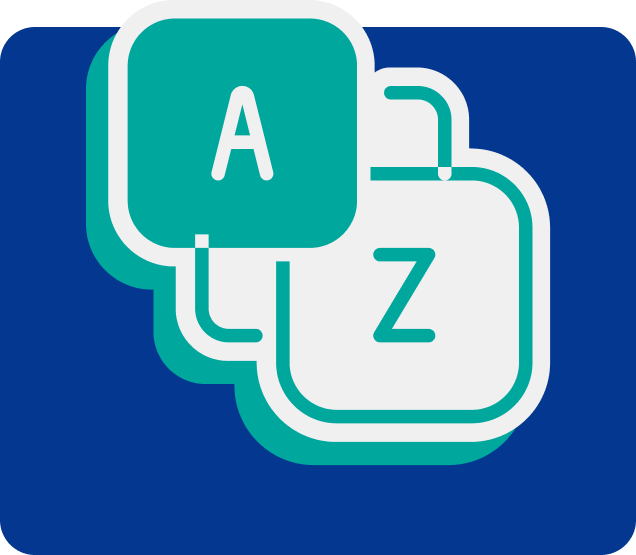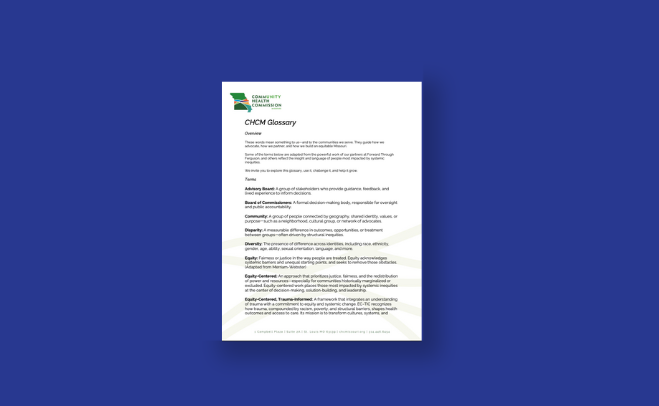
Glossary

These words mean something to us—and to the communities we serve. They guide how we advocate, how we partner, and how we build an equitable Missouri.
Some of the terms below are adapted from the powerful work of our partners at Forward Through Ferguson, and others reflect the insight and language of people most impacted by systemic inequities.
We invite you to explore this glossary, use it, challenge it, and help it grow.
Terms
Advisory Board: A group of stakeholders who provide guidance, feedback, and lived experience to inform decisions.
Board of Commissioners: A formal decision-making body, responsible for oversight and public accountability.
Community: A group of people connected by geography, shared identity, values, or purpose—such as a neighborhood, cultural group, or network of advocates.
Disparity: A measurable difference in outcomes, opportunities, or treatment between groups—often driven by structural inequities.
Diversity: The presence of difference across identities, including race, ethnicity, gender, age, ability, sexual orientation, language, and more.
Equity: Fairness or justice in the way people are treated. Equity acknowledges systemic barriers and unequal starting points, and seeks to remove those obstacles. (Adapted from Merriam-Webster)
Equity-Centered: An approach that prioritizes justice, fairness, and the redistribution of power and resources—especially for communities historically marginalized or excluded. Equity-centered work places those most impacted by systemic inequities at the center of decision-making, solution-building, and leadership.
Equity-Centered, Trauma-Informed: A framework that integrates an understanding of trauma with a commitment to equity and systemic change. EC-TIC recognizes how trauma, compounded by racism, poverty, and structural barriers, shapes health outcomes and access to care. Its mission is to transform cultures, systems, and communities by fostering equity, healing, and well-being for those most affected by trauma and injustice.
Health Equity: A state where everyone has a fair and just opportunity to be as healthy as possible, which requires dismantling systems of oppression, poverty, and discrimination.
Institutions: Formal structures—like schools, banks, media, hospitals, or religious organizations—through which social, cultural, economic, or political resources are distributed. (Adapted from Forward Through Ferguson)
Missouri Model for Trauma-Informed Schools: CHCM (previously Alive & Well Communities) co-developed the Missouri Model for Trauma-Informed Schools with DESE (Department of Elementary and Secondary Education). This model provides a structured roadmap for schools to become trauma-informed and foster resilience among students and staff.
Missouri Model for Equity-Centered, Trauma-Informed Healthcare Institutions: CHCM, in partnership with the Missouri Hospital Association (MHA) and the Missouri Perinatal Quality Collaborative (PQC), developed the Missouri Model for Equity-Centered, Trauma-Informed Healthcare Institutions. This model provides a structured roadmap for healthcare institutions to become equity-centered and trauma-informed, as well as foster resilience among providers, staff, and patients.
Policy: The shared agreements that guide how we live together, often codified in laws, regulations, and official practices. (Adapted from Forward Through Ferguson)
“Big-P” Policy: Formal policies enacted and enforced by government entities such as city councils, legislatures, or federal agencies. (Adapted from Forward Through Ferguson)
“Small-p” Policy: Informal rules, guidelines, or practices established by non-governmental organizations like businesses, non-profits, or institutions. (Adapted from Forward Through Ferguson)
Most Impacted: People or communities who are disproportionately affected by systemic oppression, underinvestment, and marginalization. Those who are closest to both the pain and the solutions.
Organizations: Non-profits, businesses, corporations, grassroots groups, and service providers operating within a community or region. (Adapted from Forward Through Ferguson)
Participatory Budgeting: A democratic process in which community members directly decide how to allocate part of a public or institutional budget.
Programs: Short-term efforts or services aimed at addressing specific needs—such as food distribution, tutoring, or health screenings. (Adapted from Forward Through Ferguson)
Racial Equity: A condition in which outcomes are no longer predictable by race. Racial equity is achieved when systems, such as education, health care, and employment, work for everyone, and all people can thrive regardless of race or zip code. (Adapted from Forward Through Ferguson)
Systems: Interconnected networks of policies, practices, institutions, culture, and people that shape how resources and opportunities are distributed. (Adapted from Forward Through Ferguson)
Systems Change: A transformation of systems so they no longer privilege one group over another. This includes altering the structures and cultures that produce inequity. (Adapted from Forward Through Ferguson)
Trauma-Informed: An approach that recognizes the widespread impact of trauma and integrates that awareness into systems, services, and practices to promote healing and avoid harm.
Wellness: A holistic state of well-being that includes physical, mental, emotional, spiritual, and social health. Beyond the absence of illness, wellness reflects the conditions, relationships, and environments that allow individuals and communities to thrive. In equity-centered work, wellness also involves addressing systemic barriers to health and healing.
Other Notes
- Terms adapted from our partners at Forward Through Ferguson are indicated with a note after each definition.
- This glossary is a living document. We welcome additions and edits as our understanding evolves in partnership with our communities.
